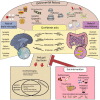Emerging epigenetic dynamics in gut-microglia brain axis: experimental and clinical implications for accelerated brain aging in schizophrenia
- PMID: 37256150
- PMCID: PMC10225712
- DOI: 10.3389/fncel.2023.1139357
Emerging epigenetic dynamics in gut-microglia brain axis: experimental and clinical implications for accelerated brain aging in schizophrenia
Abstract
Brain aging, which involves a progressive loss of neuronal functions, has been reported to be premature in probands affected by schizophrenia (SCZ). Evidence shows that SCZ and accelerated aging are linked to changes in epigenetic clocks. Recent cross-sectional magnetic resonance imaging analyses have uncovered reduced brain reserves and connectivity in patients with SCZ compared to typically aging individuals. These data may indicate early abnormalities of neuronal function following cyto-architectural alterations in SCZ. The current mechanistic knowledge on brain aging, epigenetic changes, and their neuropsychiatric disease association remains incomplete. With this review, we explore and summarize evidence that the dynamics of gut-resident bacteria can modulate molecular brain function and contribute to age-related neurodegenerative disorders. It is known that environmental factors such as mode of birth, dietary habits, stress, pollution, and infections can modulate the microbiota system to regulate intrinsic neuronal activity and brain reserves through the vagus nerve and enteric nervous system. Microbiota-derived molecules can trigger continuous activation of the microglial sensome, groups of receptors and proteins that permit microglia to remodel the brain neurochemistry based on complex environmental activities. This remodeling causes aberrant brain plasticity as early as fetal developmental stages, and after the onset of first-episode psychosis. In the central nervous system, microglia, the resident immune surveillance cells, are involved in neurogenesis, phagocytosis of synapses and neurological dysfunction. Here, we review recent emerging experimental and clinical evidence regarding the gut-brain microglia axis involvement in SCZ pathology and etiology, the hypothesis of brain reserve and accelerated aging induced by dietary habits, stress, pollution, infections, and other factors. We also include in our review the possibilities and consequences of gut dysbiosis activities on microglial function and dysfunction, together with the effects of antipsychotics on the gut microbiome: therapeutic and adverse effects, role of fecal microbiota transplant and psychobiotics on microglial sensomes, brain reserves and SCZ-derived accelerated aging. We end the review with suggestions that may be applicable to the clinical setting. For example, we propose that psychobiotics might contribute to antipsychotic-induced therapeutic benefits or adverse effects, as well as reduce the aging process through the gut-brain microglia axis. Overall, we hope that this review will help increase the understanding of SCZ pathogenesis as related to chronobiology and the gut microbiome, as well as reveal new concepts that will serve as novel treatment targets for SCZ.
Keywords: aging; dysbiosis; epigenetics; microbiome; microglia; psychobiotics; schizophrenia; vagus nerve.
Copyright © 2023 Ben-Azu, del Re, VanderZwaag, Carrier, Keshavan, Khakpour and Tremblay.
Conflict of interest statement
The authors declare that the research was conducted in the absence of any commercial or financial relationships that could be construed as a potential conflict of interest.
Figures

Similar articles
-
Gut microbiome and adaptive immunity in schizophrenia.Psychiatriki. 2019 Jul-Sep;30(3):189-192. doi: 10.22365/jpsych.2019.303.189. Psychiatriki. 2019. PMID: 31685450 English, Greek, Modern.
-
The Microbiota-Gut-Brain Axis.Physiol Rev. 2019 Oct 1;99(4):1877-2013. doi: 10.1152/physrev.00018.2018. Physiol Rev. 2019. PMID: 31460832 Review.
-
Hidden Role of Gut Microbiome Dysbiosis in Schizophrenia: Antipsychotics or Psychobiotics as Therapeutics?Int J Mol Sci. 2021 Jul 18;22(14):7671. doi: 10.3390/ijms22147671. Int J Mol Sci. 2021. PMID: 34299291 Free PMC article. Review.
-
Alteration of the gut microbiome in first-episode drug-naïve and chronic medicated schizophrenia correlate with regional brain volumes.J Psychiatr Res. 2020 Apr;123:136-144. doi: 10.1016/j.jpsychires.2020.02.005. Epub 2020 Feb 8. J Psychiatr Res. 2020. PMID: 32065949
-
Mechanisms of vagus nerve stimulation for the treatment of neurodevelopmental disorders: a focus on microglia and neuroinflammation.Front Neurosci. 2025 Jan 15;18:1527842. doi: 10.3389/fnins.2024.1527842. eCollection 2024. Front Neurosci. 2025. PMID: 39881804 Free PMC article. Review.
Cited by
-
Deconstruct the link between gut microbiota and neurological diseases: application of Mendelian randomization analysis.Front Cell Infect Microbiol. 2025 Mar 6;15:1433131. doi: 10.3389/fcimb.2025.1433131. eCollection 2025. Front Cell Infect Microbiol. 2025. PMID: 40115072 Free PMC article. Review.
-
Exploring the Role of Microglial Cells in the Gut-Brain Axis Communication: A Systematic Review.J Neurochem. 2025 Jul;169(7):e70154. doi: 10.1111/jnc.70154. J Neurochem. 2025. PMID: 40662222 Free PMC article. Review.
-
Gut microbial diversity moderates polygenic risk of schizophrenia.Front Psychiatry. 2024 Feb 1;15:1275719. doi: 10.3389/fpsyt.2024.1275719. eCollection 2024. Front Psychiatry. 2024. PMID: 38362027 Free PMC article.
-
Inhibition of oxidative stress, neuroinflammatory cytokines, and protein expressions contributes to the antipsychotic effects of geraniol in mice with ketamine-induced schizophrenia.J Neuroimmune Pharmacol. 2025 Jul 3;20(1):70. doi: 10.1007/s11481-025-10226-1. J Neuroimmune Pharmacol. 2025. PMID: 40608148
-
Pharmacotherapeutic Considerations on Telomere Biology: The Positive Effect of Pharmacologically Active Substances on Telomere Length.Int J Mol Sci. 2024 Jul 13;25(14):7694. doi: 10.3390/ijms25147694. Int J Mol Sci. 2024. PMID: 39062937 Free PMC article. Review.
References
-
- Addolorato G., Mirijello A., D’Angelo C., Leggio L., Ferrulli A., Abenavoli L., et al. (2008). State and trait anxiety and depression in patients affected by gastrointestinal diseases: Psychometric evaluation of 1641 patients referred to an internal medicine outpatient setting: Affective disorders in gastrointestinal diseases. Int. J. Clin. Pract. 62 1063–1069. 10.1111/j.1742-1241.2008.01763.x - DOI - PubMed
Publication types
Grants and funding
LinkOut - more resources
Full Text Sources

